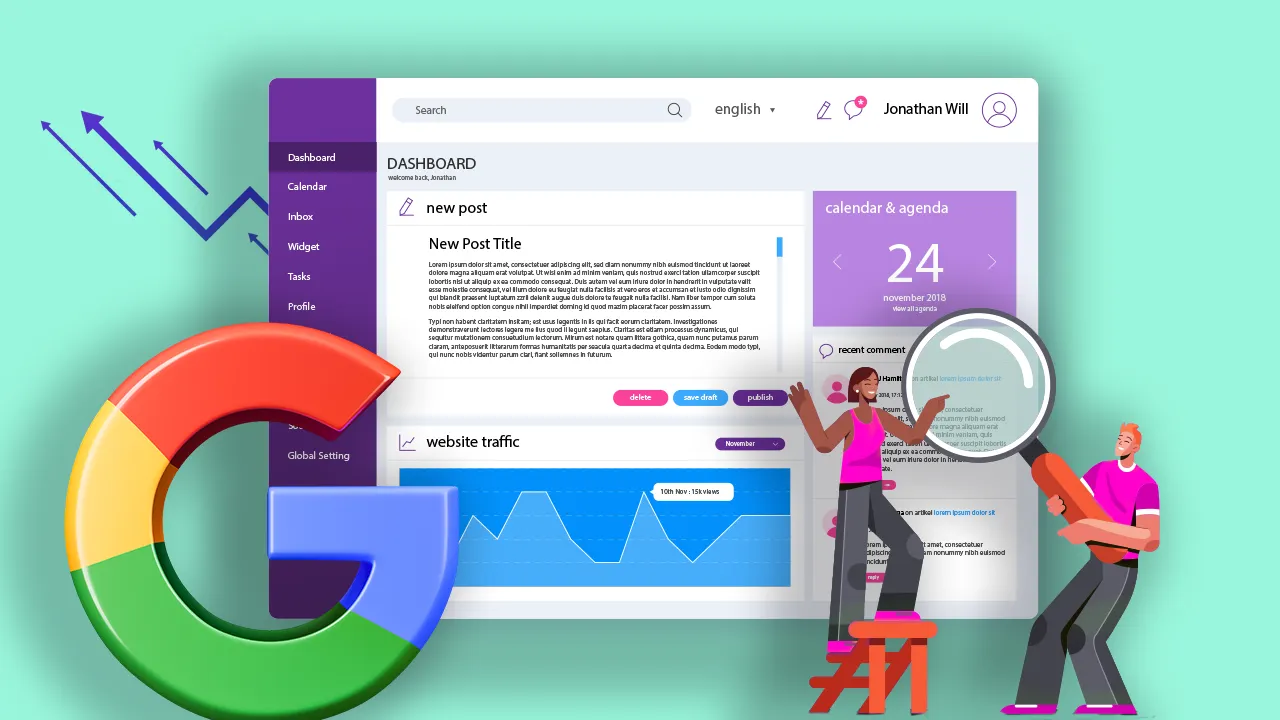
SEO for Small Businesses: The Power of Improving Rankings
When users search on Google, Bing, or Yahoo, you may make it easier for them to locate your website by using search engine optimization (SEO). You may increase traffic to your page and sales by building your website correctly and optimizing your keywords.
Business owners are becoming more and more aware of the value of the internet and how to use search engine optimization (SEO) to boost sales. Almost every business owner should want to rank well on Google’s search engine because doing so can significantly boost sales.
It might be challenging for small businesses to rank for keywords. It may seem impossible to push your way to the top of the search engine results pages due to the presence of larger, more resourceful organizations targeting those same keywords (SERPs).
How could small businesses perform well on search engine results pages? Fortunately, there is more than a good probability when local SEO is used.
If there is one thing that can be said with certainty, it is that local SEO has never been more crucial for small businesses.
Looking For SEO Companies For Small Businesses
It can seem impossible to be aware of all the components involved in developing and carrying out an SEO campaign because there are so many distinct ones.
But in a tiny company, mistakes can be expensive. You must get going right away so that your efforts can start to bear fruit right away.
Therefore, there are several typical mistakes you want to avoid when you start optimizing your website for search.
Creating Contents For Search Engines Instead Of People
You begin by identifying relevant keywords that your potential clients are typing into search engines, and you then use these keywords on your website to increase its authority and relevance.
Once you’ve created a list of keywords, you should use them frequently across your website, such as in the page URLs, page headings and subheadings, the body of text, the names of images, etc.
However, it’s tempting to overdo it and overuse keywords when you initially start optimizing your pages for search engines.
A keyword should ideally be used several times, but only if it blends in organically. Make a fast quality check to ensure that your writing is beneficial to readers and search engines alike.
Ignoring Mobile Optimization
You just cannot ignore mobile consumers, whose numbers are rising every single day. Today, rather than using desktops or laptops, an increasing number of people are accessing the internet through their mobile devices.
A recent study found that 52% of all global online web traffic in 2018 came from mobile devices. Therefore, ignoring mobile users is a bad decision.
Additionally, Google has made a mobile-specific algorithm available to assist SEO professionals in tracking and monitoring a particular website’s performance on mobile devices.
Additionally, you can assess your website’s mobile usability using free online resources like GTmetrix and Pingdom. Your website’s loading speed can also be checked on a mobile device.
Expecting Immediate Outcomes
The most straightforward error to make might be this one. You’re prepared to take the top spot in Google searches and watch the visitors pour in once you’ve worked hard to optimize your website and raise ranks for certain pages, right?
In truth, SEO is a long-term endeavor that could take 6 months of effort, and to rank highly, you must consistently produce high-quality content that shows off your knowledge of the field and benefits readers.
Small business SEO is particularly difficult because it’s likely that you don’t have a dedicated SEO team or a lot of time to keep up with all the most recent changes in search.
Along with other small businesses, publishers, well-known brands, and a variety of other information sources that show up in search results are your rivals. The points listed below would offer more insights into improving SEO for small businesses
Carry Out A Keyword Search
Finding the correct phrases to utilize on your website when writing about your content, giving names to your pages, and even choosing your URLs is made easier by conducting keyword research.
You’ll discover the search terms that consumers frequently use when looking for products similar to yours and the most pertinent words to utilize on your website. Your small business’s keywords should support your distinctive offerings and make you stand out in your specialized market.
Awesome Free Tools for Keyword Research – Ahrefs , Google Keyword Planner
Claim All Business Directories
Speaking of company directories, you need to make sure to claim your listing in each one. The most well-known options are Yelp and Google My Business.
You could believe that having a Google Business Profile is enough to increase foot traffic both online and in-person. However, keep in mind that 92 percent of search queries with a city and company category get a Yelp page in the top 5 results.
What difference does it make if your listing is in Google’s top 5 search results? On the first page of Google, 80% of click-throughs are from the top 5 results on the SERPs. Nearly 40% of results come from the first organic result alone.
All of this is to indicate that you cannot afford to not claim your company on all directories.
While Google and Yelp are the two most popular business directories, Facebook, Bing, Yahoo, Yellow Pages, and other local directories are also worth taking into account.
Create Backlinks To Your Website
Your website will appear higher in search results the more websites connect to it. Request links to your website from the proprietors of comparable websites. Offer to promote a link to their site in return for one to yours.
Consider the caliber of the links. A single link pointing to your website from a university or chamber of commerce website will be more beneficial than a dozen links from unimportant blogs.
Ensure That Your Website Is User-Friendly
Have a simple, intuitive website. Make sure your identity and what you have to offer are crystal clear to visitors.
Increase readability by using numerous headers and including your keywords in the headings. Search engines will notice headings and you will rank higher as a result.
For SEO, site speed is equally crucial. The last thing you want to do is make your website slow and irritate your users.
The last thing you should do is make sure your website is mobile-friendly. Nowadays, search engines penalize websites that are difficult to view on a smartphone.
Regularly Release High-Quality Content
Search engines’ primary goal is to assist users in finding the answers to their queries. Therefore, the greatest way to increase traffic to your website is to produce interesting material, such as articles, videos, and photographs, that gives users useful information. To keep your content current, make sure to update it periodically.
With the right content strategy, you can establish yourself as a thought leader in your industry.

Research: Your SEO strategy begins with keyword research. It compels you to learn and comprehend what searchers are looking for in relation to your products or services. You can use multiple tools for this. An important part of the research is the search intent of the consumer.
Create: The search intent is a key determiner of the kind of content people are looking for. If the current search result for a keyword has top 3 results as a video, that means that users are looking for videos for that particular keyword. Hence, your content should be a video, and also look for a competitive advantage over those existing videos.
Search Intent = Content
Distribute: Content distribution is the act of distributing your content to specific and targeted audiences in order to increase the likelihood of engagement. Because people use social media platforms as search engines, social media is a valuable ally in distributing your SEO content.
The word to remember here is “objectives.” Content distribution, as opposed to sharing your content on as many platforms as possible, is about achieving specific goals.
The goal here is to target “high potential” users in order to maximize conversion rates and, ultimately, content creation ROI.
Optimize: Simply put, content optimization is the process of ensuring that your content has the best possible chance of achieving its intended goal, whether that goal is to rank in a search engine or convert leads into customers.
Continuously monitoring your website is part of your overall SEO optimization efforts. You can use tools like Ubersuggest, Semrush, Ahrefs In the United Kingdom, SEO typically costs between £ 1,200 and £ 9,000 per month for an agency, £ 100 and £ 1,000 per hour for a consultant, and between £ 100 and £ 400 per month for a budget SEO service. This shows how valuable content creation can be in SEO.
Subscribe to the kool newsletter
Case studies. Industry Updates. Inspiring Ideas.

